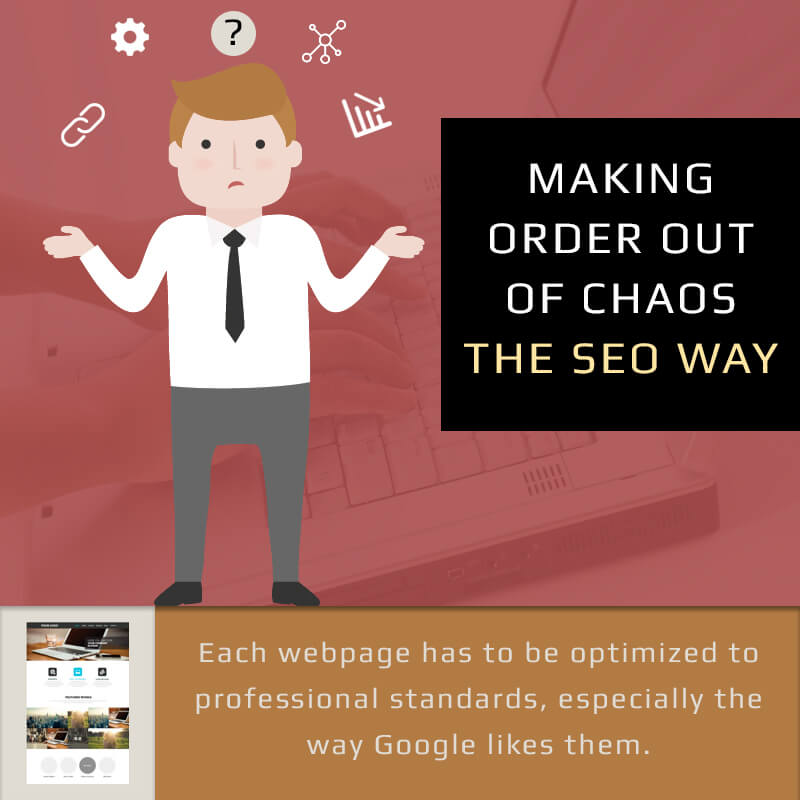 In the rush to get a website up and running, marketers and webmasters often overlook the simplest things or the most important things that make a website successful. Then, down the road, they end up in confusion as to what to do and how to solve the various problems that keep their webpages in the lower search engine results. This is where a good analysis, objective, and impartial analysis comes in and no ego tripping allowed.
In the rush to get a website up and running, marketers and webmasters often overlook the simplest things or the most important things that make a website successful. Then, down the road, they end up in confusion as to what to do and how to solve the various problems that keep their webpages in the lower search engine results. This is where a good analysis, objective, and impartial analysis comes in and no ego tripping allowed.
Believe it or not, that is one of the biggest factors in why some websites go south. Because of ego tripping. Somebody swears up and down that they know everything about web mastering, or they hired their spouse or boyfriend or girlfriend or even kids to design their sites and if anyone comes along and says their sites are rotten, they go into a fit and want to practically destroy their own online business. You have to put your egos on the sidelines. A website is only as good as its webpages since Google doesn’t list websites, but webpages. That means each webpage has to be optimized to professional standards, especially the way Google likes them.
The first step is that awfully painful impartial and objective analysis. Hire someone or if you do have colleagues or friends who are real webmasters, have them do the analysis. Tell them to pull no punches and give it to you straight. If they tell you the graphics your wife did suck, then get better graphics done. If you’re told your videos look like something from a 1940s war documentary, then get new videos made. The same thing goes triple for a copy. Do not have a rotten copy on your site that’s packed with keywords, keyphrases, and key groups. It’s just spammy and Google will penalize you for it. Google’s new software is very sophisticated and has started the industry with its superior ability to separate the chaff from the wheat. This means making sure your pages are pro level or no level.
Speaking of keywords, nowadays you don’t have to use some complex keyword strategy. Just have copy and tags that are natural as well as variations where applicable. Google’s algorithms will know what your site is about by reading the entire webpages and your keywords are listed automatically. The challenge is if you’re using keywords that the top sites are using. That competition is monstrous and difficult to defeat except if you’ve got some edge, some proprietary named product that no one else has the authority to use. In that case, just don’t worry, you’ll top out for those keywords with no sweat. The on page optimization and natural keyword use will speak for itself.
Your copy is your lifeblood here. You’ll need at least 10 to 20 good articles about 1,000 words each. Google likes the longer authoritative articles as they’re hip to spam sites that use only 300-500 words. That small word count is a red flag to Google that you’re trying to use SEO to gain an irresponsible advantage. This means you have to hire writers who are professional and you’ll have to pay that extra amount. Don’t try writing mills or software or any shortcuts. Google will know and if they detect anything screwy they will penalize you. With your pro level copy, you’ll need some link building too but you just can’t slap any links there. The links have to be relevant and from authoritative sites. The bottom line here is that your copy has to describe your site, provide usefulness to the surfer and be professionally written.
Now that you’ve got your site analyzed and ready to rock, you’ll need two more things often overlooked, mobile friendly and social media effectiveness. This means using some of Google’s mobile-friendly tools to make sure your webpages look good and function on mobile devices. Let there be no mistake about this. Your social media presence can be of major effectiveness and calls for a lot of work. You just don’t slap up a Facebook page and hope for the best, you want to engage the social media audience like a friend, a good mentor, and that will lead them to your webpages and any upsells or subscriptions you’ll want. This will be that organic traffic that you just can’t beat.








